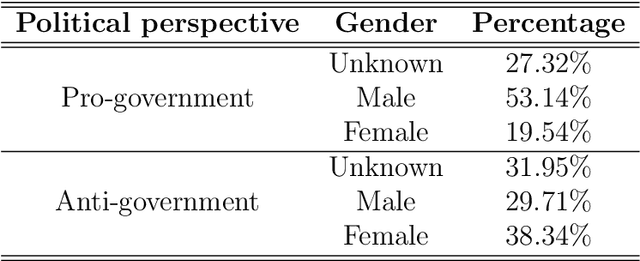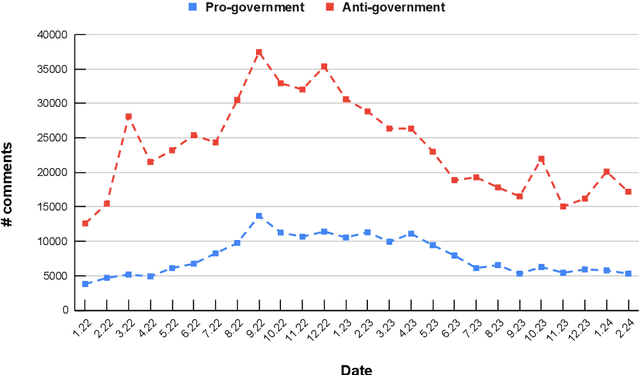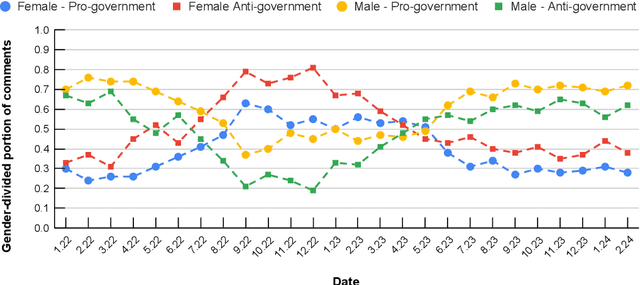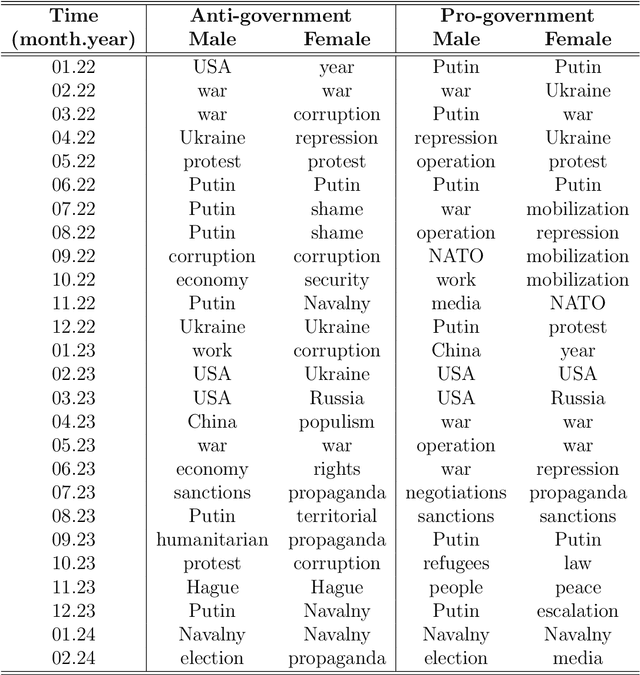Elizaveta Savchenko
Gender Dynamics in Russian Online Political Discourse
Aug 18, 2024



Abstract:The digital landscape provides a dynamic platform for political discourse crucial for understanding shifts in public opinion and engagement especially under authoritarian governments This study examines YouTube user behavior during the Russian-Ukrainian war analyzing 2168 videos with over 36000 comments from January 2022 to February 2024 We observe distinct patterns of participation and gender dynamics that correlate with major political and military events Notably females were more active in antigovernment channels especially during peak conflict periods Contrary to assumptions about online engagement in authoritarian contexts our findings suggest a complex interplay where women emerge as pivotal digital communicators This highlights online platforms role in facilitating political expression under authoritarian regimes demonstrating its potential as a barometer for public sentiment.
Investigation Toward The Economic Feasibility of Personalized Medicine For Healthcare Service Providers: The Case of Bladder Cancer
Aug 15, 2023



Abstract:In today's complex healthcare landscape, the pursuit of delivering optimal patient care while navigating intricate economic dynamics poses a significant challenge for healthcare service providers (HSPs). In this already complex dynamics, the emergence of clinically promising personalized medicine based treatment aims to revolutionize medicine. While personalized medicine holds tremendous potential for enhancing therapeutic outcomes, its integration within resource-constrained HSPs presents formidable challenges. In this study, we investigate the economic feasibility of implementing personalized medicine. The central objective is to strike a balance between catering to individual patient needs and making economically viable decisions. Unlike conventional binary approaches to personalized treatment, we propose a more nuanced perspective by treating personalization as a spectrum. This approach allows for greater flexibility in decision-making and resource allocation. To this end, we propose a mathematical framework to investigate our proposal, focusing on Bladder Cancer (BC) as a case study. Our results show that while it is feasible to introduce personalized medicine, a highly efficient but highly expensive one would be short-lived relative to its less effective but cheaper alternative as the latter can be provided to a larger cohort of patients, optimizing the HSP's objective better.
Mathematical Modeling of BCG-based Bladder Cancer Treatment Using Socio-Demographics
Jul 26, 2023Abstract:Cancer is one of the most widespread diseases around the world with millions of new patients each year. Bladder cancer is one of the most prevalent types of cancer affecting all individuals alike with no obvious prototypical patient. The current standard treatment for BC follows a routine weekly Bacillus Calmette-Guerin (BCG) immunotherapy-based therapy protocol which is applied to all patients alike. The clinical outcomes associated with BCG treatment vary significantly among patients due to the biological and clinical complexity of the interaction between the immune system, treatments, and cancer cells. In this study, we take advantage of the patient's socio-demographics to offer a personalized mathematical model that describes the clinical dynamics associated with BCG-based treatment. To this end, we adopt a well-established BCG treatment model and integrate a machine learning component to temporally adjust and reconfigure key parameters within the model thus promoting its personalization. Using real clinical data, we show that our personalized model favorably compares with the original one in predicting the number of cancer cells at the end of the treatment, with 14.8% improvement, on average.
Optimizing SMS Reminder Campaigns for Pre- and Post-Diagnosis Cancer Check-Ups using Socio-Demographics: An In-Silco Investigation Into Bladder Cancer
May 04, 2023



Abstract:Timely pre- and post-diagnosis check-ups are critical for cancer patients, across all cancer types, as these often lead to better outcomes. Several socio-demographic properties have been identified as strongly connected with both cancer's clinical dynamics and (indirectly) with different individual check-up behaviors. Unfortunately, existing check-up policies typically consider only the former association explicitly. In this work, we propose a novel framework, accompanied by a high-resolution computer simulation, to investigate and optimize socio-demographic-based SMS reminder campaigns for cancer check-ups. We instantiate our framework and simulation for the case of bladder cancer, the 10th most prevalent cancer today, using extensive real-world data. Our results indicate that optimizing an SMS reminder campaign based solely on simple socio-demographic features can bring about a statistically significant reduction in mortality rate compared to alternative campaigns by up to 5.8%.
Authorship Conflicts in Academia: an International Cross-Discipline Survey
Mar 15, 2023Abstract:Collaboration among scholars has emerged as a significant characteristic of contemporary science. As a result, the number of authors listed in publications continues to rise steadily. Unfortunately, determining the authors to be included in the byline and their respective order entails multiple difficulties which often lead to conflicts. Despite the large volume of literature about conflicts in academia, it remains unclear how exactly it is distributed over the main socio-demographic properties, as well as the different types of interactions academics experience. To address this gap, we conducted an international and cross-disciplinary survey answered by 752 academics from 41 fields of research and 93 countries that statistically well-represent the overall academic workforce. Our findings are concerning and suggest that authorship credit conflicts arise very early in one's academic career, even at the level of Master and Ph.D., and become increasingly common over time.
 Add to Chrome
Add to Chrome Add to Firefox
Add to Firefox Add to Edge
Add to Edge